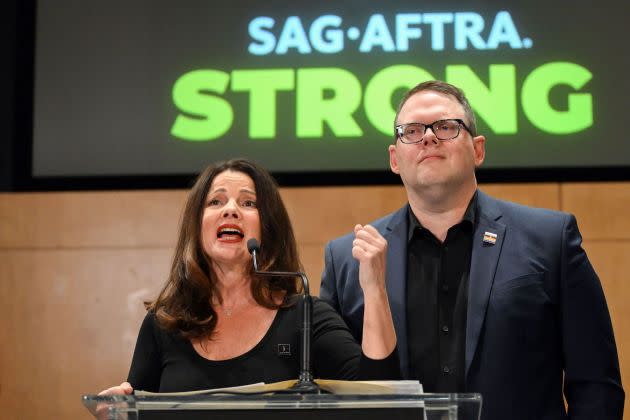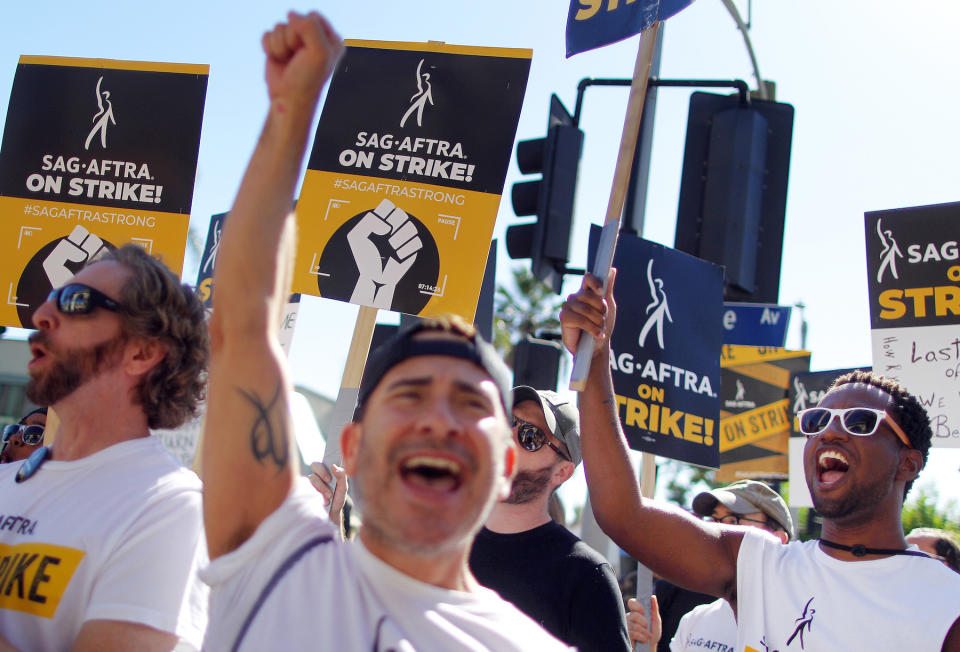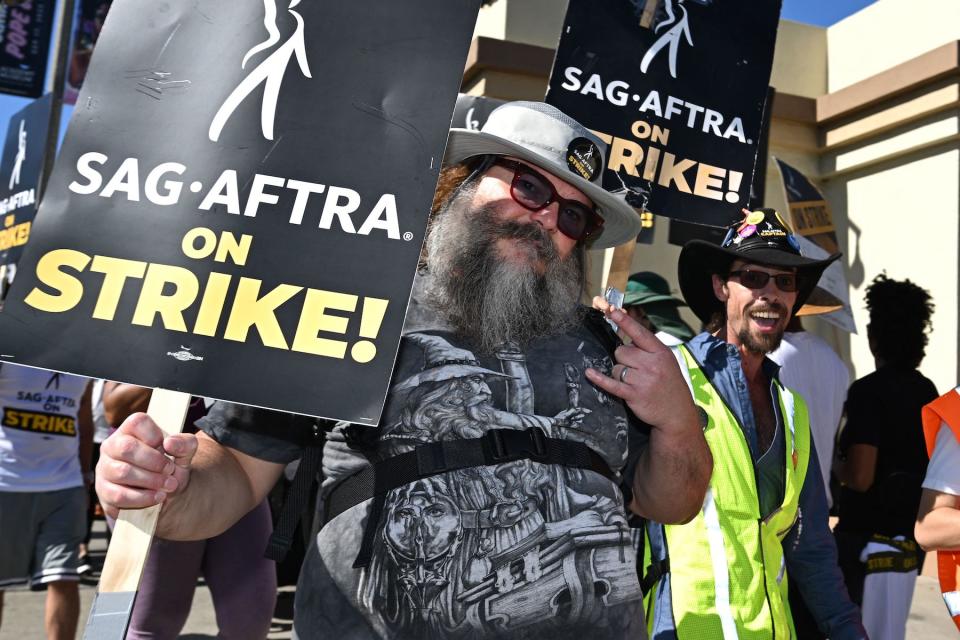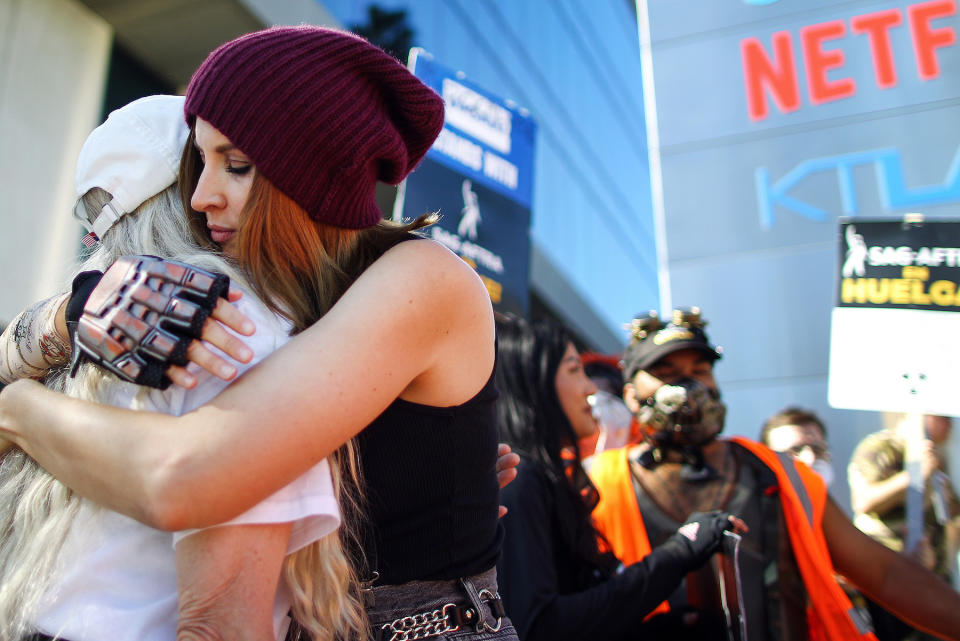‘An Existential Threat’: Actors Troubled by SAG’s AI Deal With Hollywood

As an alternate member of the Screen Actors Guild negotiating committee, Shaan Sharma spent most of this last year strategizing with other committee members and going back and forth with the Alliance of Motion Picture and Television Producers over deal points that are important to actors and their futures in the entertainment industry. As the issue of artificial intelligence is top of mind for performers, who have concerns about how the digital technology will shape Hollywood and impact their career trajectories, it was also a priority for committee members. Sharma, who says he hasn’t been afraid to speak up or be critical of union decisions in the past, tells Rolling Stone he’s concerned about the AI provisions that are included in the pe contract with Hollywood studios, which SAG-AFTRA’s 160,000 union members will vote to ratify in the coming weeks.
“Everyone understands that in negotiations, you go in and you ask for whatever you can and then you end up with whatever you can get. The question is, did the negotiating committee do its best?” Sharma tells Rolling Stone. “Did the negotiating committee honor the commitment they made to the members so that while they were throwing their bodies on the streets walking in circles they knew that they wouldn’t be let down in anything really crucial that motivated them to strike in the first place?”
More from Rolling Stone
YouTube Launches Experimental AI Feature With Voice Clones of Major Artists
YouTubers Will Have to Disclose AI-Created Content, or Risk Suspension
AI-Generated édith Piaf Biopic in the Works From Warner Music
SAG-AFTRA leadership and negotiating committee members voted unanimously to approve a tentative agreement with Hollywood studios Nov. 8, suspending the 118-day actor’s strike, halting nationwide pickets, and allowing performers to head back to work.
The deal was approved by an 86% vote by the union’s board members Friday, with some members like Sharma dissenting on the deal. SAG-AFTRA is lauding its tentative deal with the AMPTP as a groundbreaking one and the majority of members are expected to vote to ratify the contract, making it official. With scheduled info sessions throughout the week and a released 18-page summary agreement, some members have expressed concerns with the deal’s lack of protections around AI. Sharma is in the 14% of people who voted against the new contract, mostly because of his issues with the AI provisions.
In the billion-dollar deal, which the Hollywood studios touted as having “the biggest contract-on-contract gains in the history of the union,” companies must ask for consent 48 hours in advance before creating a digital replica, or a copy of a performer’s voice and likeness. Actors must also be compensated for the digital replica.

In addition, producers will need to receive consent from a performer if “synthetic performers,” which are created using generative AI, have recognizable facial features and if the actor’s name and facial features were used to generate the fake character.
Sharma says the piece in the contract around performers needing to consent to studios creating digital replicas and generative AI is not ideal. In the contract, it says consent needs to be obtained at the time of engagement, but Sharma says “there’s a case to be made that it’s not really consent if it’s the fee for entry.”
“If you want to get hired, you have to be ready to consent to be replicated, so there are people who are out there saying that consent at the time of engagement is coercion because they won’t hire you unless you give them those rights,” he explains. “And it’s only those with considerable leverage that will have the ability to say no to the replication, but still be hired. That really concerns me because most members don’t have the leverage to say no at the time of engagement.”
There are also considerable loopholes left in the contract that could potentially open actors up to a lack of recourse if their consent is “abused” by studios and streamers, Sharma reasons. The only course of action performers can take if their digital replica is used in a way they did not consent to is seeking monetary damages, but Sharma points out that “you can’t get them to change the footage.” Background actors, singers, dancers, and stunt performers are also left vulnerable by the language in this contract, Sharma says. It is also concerning to him that the contract dictates studios are supposed to be reasonably specific about their intended use of an actor’s digital replica, though there isn’t enough clarity on “what reasonably specific actually means.”
“It’ll mean different things to different people and certainly not every performer has the wherewithal, the attorneys, the agents, or the managers to make sure they get as detailed information as would be reasonably specific,” Sharma says. “So that leaves our members vulnerable.”
There’s also things that were done in the kind of mad scramble to close a deal in the final weeks, which was essentially the pressure applied by the AMPTP and the CEOs, the threats to cancel more shows, and the pressure from A-listers to just take a deal.
According to Sharma, last week’s National Board meeting was “the first thing that happened in this entire process that did not happen with integrity.” The meeting was so short, he says, “that people can’t have any faith that their board members understood what they approved.” Not only does Sharma have concerns about the AI piece in the contract, but he also has concerns about the process by which the union arrived at the deal. According to Sharma, the committee was in such a rush they didn’t take the time to understand the impact of what they were agreeing to.
“There’s also things that were done in the kind of mad scramble to close a deal in the final weeks, which was essentially the pressure applied by the AMPTP and the CEOs, the threats to cancel more shows, and the pressure from A-listers to just take a deal. There were a number of things that just eroded the strength of the majority of our negotiating committee that, for me, made the last few weeks sad.”
SAG-AFTRA national executive director and chief negotiator Duncan Crabtree-Ireland tells Rolling Stone that from his point of view, he doesn’t think the negotiating committee settled for a deal with the studios because of outside pressure.
“Although obviously we’re aware of the fact that lots of people have been out of work for a long time and people were suffering, and we’re aware of what the companies had said about their production calendars and things like that,” he says. “But I would say that [the deal] really wasn’t made under those pressure pieces or whatever you want to call them. It was made out of a strategic decision about when we felt like we had gotten everything that we could get out of this negotiation with the leverage that we had achieved from being on strike for almost four months.”
Crabtree-Ireland tells Rolling Stone that he felt the union reached “peak leverage” with the studios when they secured “sufficient” deal points on generative AI, signaling to him that it was time to reach a deal:
“Our committee really considered that and what our best alternative to making the agreement was with it, with staying on strike resulting in us achieving a better deal within a reasonable period of time.”
The Background Artists Coalition, a group advocating for workers’ rights for background players, has criticized the union’s AI deal points and has asked leadership to release the full agreement.

Sebastian Ryder, a co-chair of the Background Artists Coalition, spent the 118th day of the strike outside NBCUniversal’s New York office and was among those who celebrated SAG-AGTRA’s tentative deal last week. But after receiving the summary agreement, Ryder says the AI provisions leave room for abuse.
“Every actor in the world knows that even if you’re down to your last nickel and they’re offering you $1,000, you don’t do that because you need to maintain control of your image,” Ryder tells Rolling Stone. “It’s our livelihood. It’s our calling card. It’s what makes us money. So now in this agreement, we’re being asked to sign that away. It just doesn’t feel right.”
In a deal explainer meeting Monday, Crabtree-Ireland filtered more than 1,000 questions, with one person asking if actors could be required to give AI consent as a condition of employment.
“Yes, they can ask you for that,” he said, in the Zoom call. “If you can’t reach agreement on that, then yes, they can go and hire somebody else instead of you.”
SAG-AFTRA member Honey Brennan felt disgruntled by Crabtree-Ireland’s response and called the rights for background actors, like herself, largely disappointing. Despite this, she plans to vote in favor of the deal.
“I probably have no choice,” Brennan says. “I want to go back to work and I don’t think they’re going to do anything for us anyway. If I vote no, what’s going to happen? You go out on strike again? I doubt it.”
Katrine Hoyt, a co-chair of the Background Artists Coalition, says that while she respects the work both Crabtree-Ireland and SAG-AFTRA president Fran Drescher have done to reach an agreement, she’d like to see the full agreement before placing her vote: “Whether it’s 500 pages or five pages it doesn’t matter, but we need to see the whole agreement.”
Crabtree-Ireland claims to Rolling Stone that the agreement has not been completed and would total more than 100 pages once finalized. The 18-page summary agreement provided for members, he adds, accurately summarizes the key deal points.
“We have never had a MOA [Memorandum of Agreement] done in time for the ratification process before. We are pushing to try and get that done this time,” Crabtree Ireland says. “And I’m hopeful that we’ll be able to release it.”
I’m not interested in criticizing them. I’m just interested in what is in the document because that’s what people are going to have to live with.
Filmmaker Justine Bateman has been a vocal critic of the provisions around AI in the proposed SAG contract. Bateman, a writer, producer, and former actress, also has a degree in computer science and has been breaking down the specific language around AI in the new contract on X, formerly known as Twitter. Bateman says she was asked to advise the negotiating committee on AI during their negotiations with the AMPTP and that she doesn’t want to be critical of SAG-AFTRA’s leadership; she’s more worried about actors being educated about the minutiae of these deal points.
“I’m not interested in criticizing them. I’m just interested in what is in the document because that’s what people are going to have to live with,” Bateman tells Rolling Stone.
There are some protections in there for AI in the contract, Bateman points out, but a major concern for Bateman is the fact that there isn’t a definition of a performer as “human.” She says this is something the Writers Guild and Directors Guild both have defined in their contracts, and she wishes it was something the Screen Actors Guild was also able to include. In general, Bateman also fears how AI will continue to impact the entertainment industry as a whole.
“This is not a natural disaster that’s happening to us and we just have to deal with it. These are humans bringing this technology into areas where they probably shouldn’t and that is motivated by greed,” she says. “Generative AI in many fields, especially in entertainment, can eliminate parts of the labor pipeline from the conception to release and promotion of a project. If you start taking out those different jobs then the whole structure is going to collapse.”
As far as including the definition of an actor as a human being in the contract language, Crabtree-Ireland tells Rolling Stone that SAG “couldn’t pursue it” because the same context for the WGA and DGA’s contracts doesn’t necessarily apply to SAG members.
“Actors have already been replaced by digital replicas. That’s happened, that’s not hypothetical. It’s not something coming in the future,” Crabtree-Ireland says. “And there’s nothing in our contract except for these AI provisions that would protect against that, so if we would have just adopted a statement that says an actor is a human being, that would be a great statement from a PR perspective but it would do absolutely nothing to protect our members from abusive use of digital replicas or anything else.”

While she’s dissatisfied with the language around AI in the proposed contract, Bateman says she’s not advising people to vote one way or the other.
“That’s not my focus. My focus since February has been to just let people know that crew members, writers, actors, producers, and even executives are going to get replaced and just say, ‘Hey, this is what’s coming, be aware,’ because I love this business,” Bateman says. “I love all the people who are called to this business and I don’t want them to discover for the first time how AI has infringed upon what they love to do at the moment that happens. I’d like them to know beforehand and to also be aware of how they’re protected in the contract and in the minimum basic agreement so that they know what to add to their individual contracts.”
Satu Runa, who’s been a member of the Screen Actors Guild since she appeared on Dawson’s Creek in the early 2000s, echoes Bateman’s concerns based on what she’s read of the AI summary points. Although there are clear definitions for digital replicas as well as generative AI (GAI), the summary agreement does not define an actor as a human being, and Runa is also concerned about the ability for filmmakers to “resurrect deceased performers on screen.”
If a performer gives a Hollywood studio the OK, the consent continues until after their death, according to the summary agreement. And if a deceased performer is in need of consent, a representative, heir, or beneficiary can give the all-clear.
“What we see in the summary so far is that they haven’t defined an actor as a human being. They define a synthetic performer but they don’t define ‘performer as human,’” Runa tells Rolling Stone.
For Runa, there are larger societal implications to studios using AI to make film and TV projects involving deceased performers, on top of her worry that this can make actors “replaceable altogether.” On Tuesday, Warner Music Group announced they’re partnering with French singer Edith Piaf’s estate to make a biopic about her life, using AI technology to recreate Piaf’s voice and image. This is one example of many possible future implications, Runa says, in which the future looks bleak.
“Personally, I think it’s unethical. This is really bad for the mental health of society because when people get used to seeing this on screen, it sort of diminishes the value of a human life,” Runa says. “What concerns me is that people are going to become desensitized to seeing headlines like that very quickly and they’re probably not going to have an issue with it, and that’s not a good thing because the initial reaction that this isn’t right is the correct response.”
Personally, I think it’s unethical. This is really bad for the mental health of society because when people get used to seeing this on screen, it sort of diminishes the value of a human life.
Strike captain Iris Liu recently joined SAG-AFTRA in 2022 before spending nearly all 118 strike days picketing outside of Paramount Studios. While Liu says she’s appreciative of everything the negotiating committee has accomplished as far as getting this proposed contract to where it is, she still has her concerns about AI in general and the lack of knowledge people have surrounding the ways it already exists in the entertainment industry.
“I think what’s challenging is that without the full language of the document, we’re relying on a bunch of summaries from different sources, whether it’s the union itself or other experts, in order to figure out our comfort level with artificial intelligence,” Liu tells Rolling Stone. “We have to parse through not only really complicated issues, but also different biases.”
Liu says she’s still trying to make sense of the AI portion of the contract, noting “there are so many questions to ask.” She says she’s listened to several informational meetings to help draw more conclusions. People are actively engaged for the first time in a long time, Liu says, and they want a level of transparency and information “so that we can make an informed decision with our vote.”
The SAG-AFTRA contract negotiations have brought the topic of AI to the forefront even though it continues to impact industries across the globe. The deal points will help set a precedent for other unions and organizations coming up against similar issues when it comes to AI in their separate fields of work, many SAG members say, making the AI protections in SAG’s contract especially significant. In addition to SAG leadership, Liu asks overall, “Where do we need the government to weigh in?”
“I think SAG-AFTRA has kind of drawn a line in the sand as far as some of the first regulations on AI in entertainment and it’s kind of this sticker shock for everybody, like, ‘Oh my gosh, this is something that we have to think about,’” Liu says. “I think we all need to direct our collective energy toward fighting for government regulation on this so that not only SAG-AFTRA actors are protected, but everybody, our whole world. We all need protection from misinformation.”
Union members have until Dec. 5 to vote on the deal. While some members of SAG-AFTRA have expressed their concerns around the AI provisions and aren’t confident about where they stand with the new contract, Sharma points out that he feels the solidarity of the union is “way stronger than it was before this process, even if this contract isn’t acceptable to me.” After picketing outside of major studios every day for 118 days and spending months together on the negotiating committee going back and forth with the AMPTP, he says members have an increased awareness of their rights, the details of their contract, and an even closer bond with one another.
“It takes years to understand our contract and we do not have enough time for members to get up to speed on all of the details and make a truly informed vote,” says Sharma. “People are trying their best in a very tough moment in human and acting history because we’ve never faced an existential threat to our profession quite like this.”
Best of Rolling Stone
